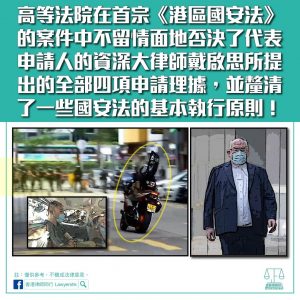In a recent judgment of the Court of First Instance in relation to an application for a writ of habeas corpus

In a recent judgment of the Court of First Instance in relation to an application for a writ of habeas corpus (application requiring a person under arrest to be brought before a judge or into court, especially to secure the person’s release unless lawful grounds are shown for his/her detention), the Applicant sought to challenge his detention and the constitutionality of a few articles of the National Security Law. The application for the writ of habeas corpus was dismissed.
The Court said the following in its judgment on 21 August 2020 :
1. On the application for a writ of habeas corpus:
The central issue in an application for a writ of habeas corpus is whether there is lawful authority for a detention. Since the Applicant’s detention is pursuant to an order of a magistrate made in the ordinary discharge of his judicial functions, there can be no question of his detention being without lawful authority.
2. On judicial independence:
The Applicant’s counsel alleged that the Chief Executive’s nomination of judges in cases concerning National Security Law would affect their independence. However, under the National Security Law, the Chief Executive does not assign or nominate any particular judge to hear any particular case. The question of which judge is assigned to hear any given case remains a matter for the Judiciary and not the Chief Executive. Under the Basic Law, judges of the courts of the HKSAR are appointed by the Chief Executive on the recommendation of an independent commission. There is thus already some degree of institutional relations between the Chief Executive and the Judiciary. A judge is bound by the Judicial Oath taken by him upon his appointment, which requires him to discharge his judicial duties in full accordance with the law and without fear or favour. The Court does not believe that a reasonable, fair-minded and well-informed observer would think that those judges are, or may be, no longer be independent of the Government.
3. On minimum sentence:
The Applicant’s counsel alleged that the creation of minimum terms of imprisonment in the National Security Law neutralizes the exercise of the independent judicial power of the HKSAR. The Court does not agree with this. As a matter of principle, it is not objectionable for the legislature to prescribe a fixed punishment (eg life imprisonment in the case of murder), or a range of sentences (including a maximum and minimum sentence) for any particular offence, leaving it to the judge to determine the appropriate sentence on the facts of any given case.
4. On inaccessible law:
The Applicant’s counsel submitted that the lack of an official or authentic text in English of the National Security Law frustrates the Applicant’s right to choice of lawyers under Article 35 of the Basic Law. The Court does not agree with this. There is no law requiring a national law promulgated in the Chinese language to be accompanied by an authentic English text.
The Court does not see that the Applicant’s right to choice of counsel has been unlawfully impaired. The impairment, if any, is the consequence of the Applicant’s preferred counsel being unable to read or understand one of the two official languages of the jurisdiction. It is, ultimately, a matter for the Applicant to retain a suitable and appropriate barrister to represent him in the present case. It is a fact that there is a large pool of competent senior counsel in Hong Kong who can read and understand Chinese, and who can represent the Applicant in this case.






